Written by Scott Wilson

While computer scientists have been burning the candle at both ends coming up with revolutionary new capabilities in machine learning and reasoning, bioscientists haven’t been resting on their laurels. Indeed, the biotechnology industry has had just as many big breakthroughs, and a much greater impact on the lives of most people on the planet.
Although artificial intelligence is in all the headlines today, the truth is that biotechnology has been quietly making a difference for decades.
Explorations of the technical aspects of biology have led to advances in such varied areas as:
- Food production and agricultural development
- Criminal forensics
- Public health and vaccine development
- New cancer-fighting drugs
- Better understanding of biodiversity and environmental impacts
These are just a taste of biotechnology’s potential, though. Research on even more effective disease prevention, anti-aging medications, and pollution-eating microbes have the chance to profoundly affect daily life on planet Earth even further.





But when you talk about putting the exciting new capabilities of artificially intelligent machines together with biotechnology research and development, all those amazing breakthroughs may look like the invention of the candle compared to the creation of nuclear energy.
What Is Biotechnology?
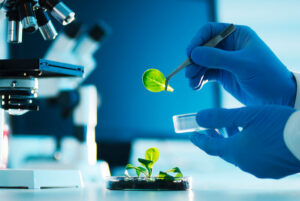 Biotech comes at the intersection of natural science and engineering. It is a discipline that treats biological and biochemical processes as factories for manufacturing or altering chemical or biological substances.
Biotech comes at the intersection of natural science and engineering. It is a discipline that treats biological and biochemical processes as factories for manufacturing or altering chemical or biological substances.
While some of the most critical developments in biotech are healthcare related, such as tissue cultures for experimental purposes or the development of new pharmaceuticals, it is a technology with broader potential. Today, scientists are using biotech in key areas like:
- Genetically engineered crops with better environmental tolerances and disease resistance
- Biofuels to replace carbon-emitting fuels
- Creation of biodegradable plastics that will break down in the environment rather than adding to pollution problems
- Developing organisms that will seek out, ingest, and break down pollutants to naturally clean up spills and waste in the environment
Artificial intelligence stands ready to accelerate those elements of biotechnology and more.
How Artificial Intelligence Will Change the Work and Potential of Biotechnologists
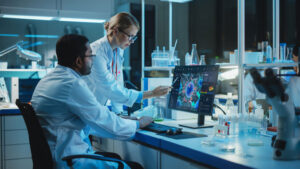 Considering the many different areas of science and engineering where biotechnology is used, it might be too much to expect that uses for artificial intelligence in the field will fit neatly under one banner.
Considering the many different areas of science and engineering where biotechnology is used, it might be too much to expect that uses for artificial intelligence in the field will fit neatly under one banner.
Instead, many of the ways that AI is used in biotech will wind up happening in various related fields, such as medical science, pharmaceutical development, and environmental science.
Pulling back to find the common threads, though, you can see that most of the direct impacts of AI in biotechnology will fall into areas of the field like:
Simulation and Modelling
AI, and particularly generative AI, has already proven invaluable in analyzing extremely complex systems and substances that would take human scientists decades to explore through direct lab work. AlphaFold, the DeepMind project to explore all potential protein structural sequences, generated some 200 million protein structures from more than 1 million species… nearly every known protein on Earth.
It’s just one example of how AI trained on vast amounts of data from extremely complex biological systems can quickly develop insights and accurate predictions in structure and behavior. Working with molecules and systems with large numbers of potential interactions, biotech will benefit from AI pointing it in the right direction.
Collation and Cataloging
Sensors and electronic records are providing more of that data than ever to train AI systems with. But simply organizing and making sense of that data in the first place is a challenge for biotechnologists.
Artificial intelligence is already making waves in data science with the ability to parse and find connections in disparate data sets. Whether it’s genomic catalogs or ecological data, AI will have a role in assembling, managing, and assessing large volumes of information for biotech uses.
Investigating the Mechanisms of Life
Genetics remains a poorly understood factor in the development of everything from fatal diseases to the color of your eyes. There are so many deeply embedded connections that, even with a full genome map, researchers are lost in offering definitive explanations for genetic expression.
Artificial intelligence can take in all that data and find connections that human researchers might never spot. By connecting behavioral observation and cellular information, new insights will be discovered that can impact everything from medical diagnostics to individually tailored pharmaceuticals.
What Kind of Jobs Will Biotechnology Offer Artificial Intelligence Professionals?
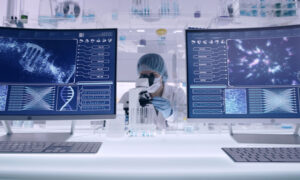 The front line of artificial intelligence work in biotechnology today and for the foreseeable future rests on the shoulders of researchers. Scientists are building their own tools to dive into the challenges they face in the lab, and they are developing AI and machine learning programming skills to do so.
The front line of artificial intelligence work in biotechnology today and for the foreseeable future rests on the shoulders of researchers. Scientists are building their own tools to dive into the challenges they face in the lab, and they are developing AI and machine learning programming skills to do so.
Of course, biologists and medical research scientists don’t necessarily have all the skills needed to design, program, and train AI systems. They already work with dedicated AI researchers, AI programmers, and AI engineers to help put together the systems they need. Some titles being hired in the field today include:
- Algorithm Development Chief Scientist
- Senior Data Scientist (AI)
- Principal Scientist in Artificial Intelligence/Machine Learning for Biology
- Computational Biologist
- Senior Bioinformatics Research Scientist
These roles are found at colleges and universities, government research laboratories, and at big agricultural, pharmaceutical, and chemical companies. Additionally, nonprofits working in various areas of agricultural and environmental science will be looking for AI experts for their teams soon.
As AI-fueled biotech becomes more common, there will also be roles in production and operations that involves AI experts. These may not always say artificial intelligence right in the job title, but will echo existing positions in the field:
- Biotechnology Data Analyst
- Statistical Genomic Researcher
- Computational Chemist
Many positions in biotech reflect more specific specialties within the field, as well, like bioinformatics researchers.
As AI becomes more and more a part of the standard set of tools, most jobs in the field will involve it at various levels.
Looking at AI Degrees for Biotechnology Careers
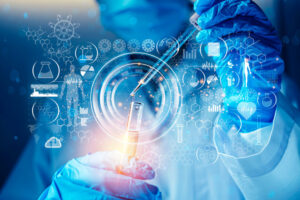 Biotech and the biosciences generally are well known as an area for research and applications of artificial intelligence. It’s quite common to find degree programs available that allow specialization in the field.
Biotech and the biosciences generally are well known as an area for research and applications of artificial intelligence. It’s quite common to find degree programs available that allow specialization in the field.
Because this is all very science-heavy investigation and lab work, research is an important part of those degrees. It’s unlikely that any of the positions in the field will be accessible without at least a graduate degree.
So the best preparation for most positions will come through a degree like a Master of Science in Intelligent Systems Engineering Bioengineering track, or a Master of Science in Applied Artificial Intelligence Biomedical Engineering concentration.
These specializations come with the usual AI coursework in deep and machine learning, advanced programming, and statistical analysis. But they also throw in training in areas like:
- Biomaterials and tissue engineering
- Physiology and cellular biology
- Advanced systems neuroscience
- Molecular biology
A closely related degree that offers similar training, with a slightly different emphasis, is the Master of Science in Computational Biology. The same ground is covered, with greater emphasis on biological studies and less on AI.
Certificates and Certifications for AI in Biotechnology
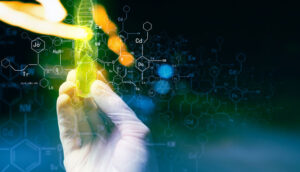 For anyone already working in the industry, with their college days a tiny speck in the rearview mirror of their career, a certificate program in any of those areas can offer the retraining necessary to get on the AI train.
For anyone already working in the industry, with their college days a tiny speck in the rearview mirror of their career, a certificate program in any of those areas can offer the retraining necessary to get on the AI train.
A Graduate Certificate in Computational Biology, and Bioinformatics Graduate Certificate, or a Graduate Certificate in Artificial Intelligence all offer very specific upgrades to knowledge and skills for AI applications in biotech.
With only a handful of courses, certificates can’t and don’t try to offer a complete education in those fields. But what they can do, in much less than a year, is built on experience and education to dramatically advance a student’s capabilities in their focus area.
The right choice depends a lot on career objectives and educational background. With the benefit of insight into the field and where it’s going, current professionals usually have a pretty good idea of where to place their bets.
They also understand the value of professional certification in an AI career. While there are no certifications specific to biotech AI, general AI and ML certifications can be useful in certain specific areas of biotechnology research.






